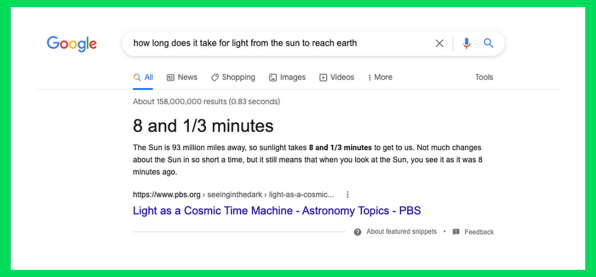- | 8:00 am
Google Search is rolling out its long-awaited updates to snippets
The model can now understand the notion of consensus, which in this case is when multiple high-quality sources all agree on the same fact.

Google is rolling out changes to its featured snippets. While that text box at the top of a Google search page can be helpful, it’s also been known to spread misinformation.
The tech giant announced Thursday it was rolling out its latest AI model, called the multitask unified model, in an attempt to deliver more accurate information. Google said that the model can now understand the notion of consensus, which in this case is when multiple high-quality sources all agree on the same fact. The algorithm is supposed to be able to check snippet callouts (when the words above the featured snippet are in a larger font) against other sources on the web to see if there’s a general consensus, even if they use different words or concepts to explain the same thing.
There’s also the separate concern of when Google snippets information that may not be the most helpful to an answer. The search team highlighted an example that didn’t have an answer: “When did snoopy assassinate Abraham Lincoln.” That search provided a snippet highlighting an accurate date and information about the president’s assassination, but it doesn’t necessarily shut down the claim that the cartoon dog was behind it.

Google VP of Search Pandu Nayak said in a blog post that its update will reduce the triggering of featured snippets in these cases by 40%.
The updates are part of Google’s larger efforts to fight misinformation on the platform. The company last year launched “about this result,” which adds context to any search result if users tap the three dots next to the result before they click on the web page. Users have been only been able to use that on the search webpage, but the company is expanding the feature in the Google app. Users will now be able to swipe up from the navigation bar on any page to get more information on that source.
Google is also adding more context to its “about” feature, including how widely a source is circulated, online reviews of the source or company, and whether the company is owned by another entity.







































